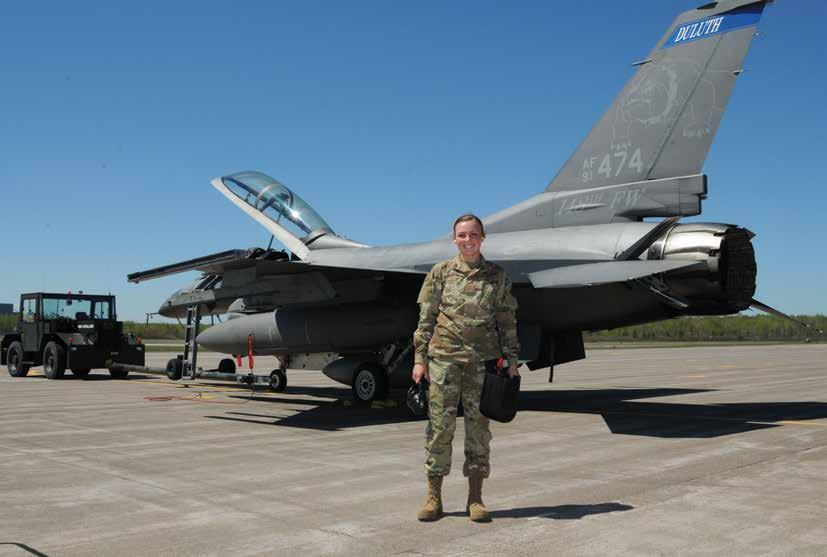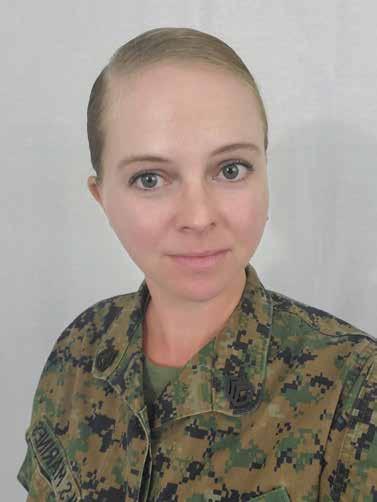
7 minute read
Women in Service: The sky is the limit
By Ann Klefstad
Women have always served their communities, and their nations — sometimes in disguise. In 1782, during the Revolutionary War, for instance, Deborah Samson Gannett enlisted under her brother’s name. She was wounded twice, and cut a musket ball out of her own leg so her gender wouldn’t be found out. In 1804, Samson was awarded a pension for her service.
Nowadays women and men can play similar roles in this task. We’ll talk here with some of the women in our services: from the Navy, the 148th Wing of the Air National Guard, the Marines, and the Coast Guard.
If you or members of your family are interested in serving, these women’s experiences may give you an idea of the services they work with. There are myriad opportunities to use your talents in the service of your nation. According to the Defense Department, 15 percent of the Army, 9 percent of the Marine Corps, and 20 percent of the Air Force are currently women.
Audra Vance
Audra Vance is in the U.S. Navy, serving in Human Resources. She joined at 18, after attending a College Fair and picking up a pamphlet. She also discovered some hidden military history in her family: her grandfather had also served in the Navy.
Her pre-boot-camp haircut, she remembers, was “the shortest and probably worst haircut I ever got!” But despite the trepidation of the first night and first day, arriving at night in the snow with hundreds of other new sailors, she remembers the beginning of an esprit de corps.
“The smallest recruit in our division was weighed down with her sea bag (which was about as big as she was) and her ditty bag. As we marched around the base by streetlight through falling snow, her bag appeared to get heavier and heavier. One of the other recruits grabbed her ditty bag and helped as we continued to march through the night. We all lost track of time and our bearings. . . Eventually we wound up at our barracks and we were able to rest for the night.”
She began her journey as an enlisted sailor. After six years of active duty, the Navy sent her to UCSD to earn a degree and an officer’s commission.
Vanceis scheduled to retire soon, after 24 years in the Navy. Her experiences as a young active duty sailor were different from those of an officer with greater responsibilities. She’s now the Officer in Charge at the recruiting station in Minneapolis that covers seven
Midwestern states.
Vance had served at sea after completing her degree.
“My first and second officer tours were onboard the USS Bunker Hill (CG-52) and USS Lake Champlain (CG-57) out of San Diego, as Strike Warfare Officer and Training Officer,” she explained.
She started as an enlisted sailor, did two tours as a Surface Warfare Officer, and transferred into the HR community, where she is today.
She notes that a military life was great preparation for life in general.
“One of the biggest benefits is learning how to respond to stress, pressure and working with minimal resources,” she said. “Out to sea is the best example, where you have to work with what is on hand; it stretches the creativity levels of the sailors. . . . Malfunctions are not usually a life-ordeath situation, but they can be. Whether it’s training or real-life events, the Navy practices like they play.”
Audrey Beaudry
Audrey Beaudry is an Airman 1st Class in the Air National Guard here in Duluth. In contrast to Vance, she is new to this life, but is the third generation in her family to make a career in her unit.
She recalls her boot camp: “Basic . . . puts you in a room with strangers that in the end become family. Everyone goes through the same thing, and it’s a part of all the memories made at training that no one else will understand. You meet people from all over, and hear about their lives back home. Being in the military is different from civilian life. . .”
Her official title is now Aircraft Armament on F-16s. She’s looking forward to the rapid learning that comes with practicing her craft, and also appreciates the educational benefits the Guard offers.
“Depending on your job, you may also get things such as the GI Bill, the GI Kicker, and bonuses, which are all things that apply to my career field,” she said.
What matters most to Beaudry, though, is that her role “teaches you a lot about yourself, like pride and discipline, makes you appreciate everything a lot more. It has made me become a much stronger and independent individual.”

Michelle Reif
Staff Sgt. Michelle Reif, U.S. Marine Corps, is very proud of her service. Her situation after high school will sound familiar to many.
“I had decided to drop out of college at the University of
Continued on page 28
Wi th in ou rw alls, we ma ke ap ositiv ei mpa ct on pa tien ts ’l iv es. Fr om to ta lc om fo rt to sta te -o f- th e-art su rg ery to sa ving out-o fpo ck et co sts. Ou tp at ien ts ur ge ry ex ce llenc e –i t’ sa ll in ad ay ’s wo rk.
Minnesota after my junior year,” she said. She didn’t have a major and was running out of money, working as a server in a restaurant. “I felt very lost about what the next step in my life should be. My best friend had just enlisted into the Marines and she convinced me to speak to a recruiter.”
She loved the challenge and prestige offered by the Marines, which drew her in with their focus on selfdiscipline and selfconfidence. Marine Corps recruit training differs from the boot camps in the other branches, she noted. Recruits are not considered Marines until they complete The Crucible, the culminating event, toward the end of the 13 weeks of training.
“You don’t JOIN the Marines,” Reif explained. “You BECOME one.”
As a consequence, the friendships she’s developed within the Marine Corps are strong, arising from shared hardships and experiences.
“I’ve become close with people who are different from me on many levels, but that has never mattered to our friendship because we are all Marines first. . . .Marine Corps veterans go out of their way to help each other and support each other.”
Reif is the Marketing and Communications Chief for Marine Corps Recruiting Station Twin Cities, acting as the public affairs representative for the area, doing community relations, social media, media liaison, special events management, and much more. She appreciated the training.

“I learned basic journalism, photojournalism, videography, and broadcasting,” she said.
Additional training in skills and leadership is available through the Corps, and after leaving active service, you can go to college on the GI Bill.
After serving eight years, she’s in the process of leaving the Marines. She’s ready to enter the Hubbard School of Journalism at the University of Minnesota and move into public relations work as a civilian.
Angela Roman
Angela Roman retired from the US Coast Guard in 2013. She grew up in a military family, with parents who served in the Air Force and a grandfather who spent World War II in the Army. But her parents left the service when she was a young child. When she was 14, though, she found an article in her grandfather’s VFW magazine on Coast Guard icebreakers, and “that was it. I wanted to be on a ship powerful enough to break ice, that went to Antarctica, Australia, and other exotic places,” she said. “My recruiter was a great guy, but he failed to mention that there were no billets for women on icebreakers in 1985. It wouldn’t have mattered anyway. . . .”
She went to boot camp in September 1985. Things she remembers:
• “Wishing I had taken my recruiter’s advice about building up my running endurance. Running is not my friend.”
• “Singing in the squad bay in the evening, while we ironed our uniforms and shined our boots or shoes. We sang everything from Boston to Mr. Mister to the Doobie Brothers. ‘Broken Wings’ and ‘Black Water’ still take me back to the smell of starch and shoe polish.”
• “Feeling the drama of everything. Everything was the most important thing in the world, the highs were the highest and the lows were the lowest. I think that came from being in boot camp and being eighteen years old.”
As a Coastie, Roman said, you change units every few years. Sometimes that means a change of job but more often it means you uproot your life and move hundreds or thousands of miles away.
“For me, this means I have loads of acquaintances and a small handful of true friends, my tribe. . . . The distance doesn’t make them any less my people.”
When Roman joined the Coast Guard, she was a mechanic.
“I was waiting for the day when I wasn’t a rarity, when people weren’t asking why, as a woman, I became a mechanic. It never occurred to me to look forward to the day when sexist remarks and jokes would stop. I had four brothers and bought into the ‘boys will be boys’ culture.”
Today, she notes, there are more women of higher rank who are actively keeping women networked and supported. And the culture has changed.
The Coast Guard offers tuition benefits for enrolled staff, but Roman didn’t use them. She did, however, use the GI Bill to get a bachelor’s degree in creative writing at Penn State Erie.
Roman is an advocate of Coast Guard service.
“You learn it’s not just you, that you’re part of something bigger than yourself. There is the potential to have a lot of responsibility at a young age – at a small boat station, it’s not uncommon for the person in charge of the boat and its crew to be in his/her early 20s.”








